|
|
|
Sort Order |
|
|
|
Items / Page
|
|
|
|
|
|
|
| Srl | Item |
| 1 |
ID:
151182
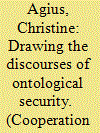

|
|
|
|
|
| Summary/Abstract |
The controversy of the Danish cartoon crisis in 2006 overshadowed a similar one that took place in Sweden a year later. The crises have broadly been framed as a clash of values but both cases reveal differences worthy of investigation, namely for the complex tensions and convergences between the two states on questions of immigration, Nordic solidarity and national identity. This article aims to explore the intersubjective discourses of identity that were threaded through the debates on the cartoon crises, looking to the overlapping discourses that have constructed ideas of identity in terms of ontological security, or security of the self. It argues that both cartoon crises represent a complex discursive performance of identity that speaks to a broader set of ontological security concerns which intersect at the international, regional and national levels. Even in their differences, Swedish and Danish discourses show the tensions associated with the desire for a stable and consistent idea of self when contrasted with the Muslim ‘other’, explored in the context of discourses of modernity and tolerance, which operate as key sites that work to reiterate, reclaim and reinstate the idea of the progressive state.
|
|
|
|
|
|
|
|
|
|
|
|
|
|
|
|
| 2 |
ID:
151184
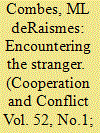

|
|
|
|
|
| Summary/Abstract |
Since 9/11, the rise of Islamist extremism has taken hold of the national imagination as the greatest threat facing the USA. The 2013 Boston Marathon bombing seemed to add a new chapter to the War on Terror with the ‘introduction’ of homegrown terrorists who wantonly kill innocent Americans, just as the 19 hijackers did. They are evil. Yet, the narrative of the Tsarnaevs that emerged shortly after the attack crafted a far more ambiguous relationship to these threatening bodies. What allows for such ambiguity, given the Tsarnaevs’ murderous acts? In this article, I look at how identity demarcation was used directly after the bombing as a form of securitization, paying particular attention to the role of the stranger. Contributing to both identity and ontological security theory, I argue that analyzing the discursive (re)presentation of the liminal and its mediation between inclusion and exclusion best captures the multifaceted nature of security, which includes both ontological and material well-being. I show that the particular manner in which the stranger shows up in the portrayal of the Boston attack helps steer American identity practice(s) down specific paths of meaning-making that are not as clear-cut as ‘righteous Self’ versus ‘evil Other.’
|
|
|
|
|
|
|
|
|
|
|
|
|
|
|
|
| 3 |
ID:
151181
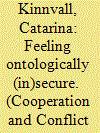

|
|
|
|
|
| Summary/Abstract |
This article proceeds from a conceptual analysis of how ontological (in)security is constructed in terms of ‘security-of-being’ in which identity dynamics are explicated in socio-psychological terms. Of particular interest is how such dynamics transcend the boundaries of individual self/other constructions to define communities and states, and how these dynamics are transformed in times of trauma and crises. Narratives of everyday traumas are especially significant in creating notions of gendered space and (in)security, and for securitising subjectivities. This article thus investigates a number of theoretical propositions and developments involved in recent debates on the emotional dimension of ontological (in)security and its relationship to states, traumas and the securitisation of subjectivity. A gendered perspective of these debates allows us to analyse, and perhaps move beyond, some of the problematic aspects of the ontological security literature as originally developed by Laing and Giddens, and later on by sociologists and international relations scholars. Using the case of India as an example, the article shows how narrative reconstructions of traumas and collective memory shape gendered space and the search for ontological security, and how attempts to govern these events and practices impact on notions of gendered space and ontological insecurity.
|
|
|
|
|
|
|
|
|
|
|
|
|
|
|
|
| 4 |
ID:
151176


|
|
|
|
|
| Summary/Abstract |
The performance of International Relations (IR) scholarship – as in all scholarship – acts to close and police the boundaries of the discipline in ways that reflect power–knowledge relations. This has led to the development of two strands of work in ontological security studies in IR, which divide on questions of ontological choice and the nature of the deployment of the concept of dread. Neither strand is intellectually superior to the other and both are internally heterogeneous. That there are two strands, however, is the product of the performance of IR scholarship, and the two strands themselves perform distinct roles. One allows ontological security studies to engage with the ‘mainstream’ in IR; the other allows ‘international’ elements of ontological security to engage with the social sciences more generally. Ironically, both can be read as symptoms of the discipline’s issues with its own ontological (in)security. We reflect on these intellectual dynamics and their implications and prompt a new departure by connecting ontological security studies in IR with the emerging interdisciplinary fields of the ‘vernacular’ and ‘everyday’ via the mutual interest in biographical narratives of the self and the work that they do politically.
|
|
|
|
|
|
|
|
|
|
|
|
|
|
|
|
| 5 |
ID:
151174
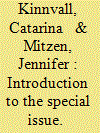

|
|
|
|
|
| Summary/Abstract |
The research community of ontological security scholars is vibrant and wide-ranging, defined by a conceptual core and by the themes through which scholars register their disagreements. In this special issue we have collected some of the work that has been produced or inspired by discussions and meetings during the last few years. The goal is to showcase some of the breadth of insights and possibilities on the topic of ontological securities and insecurities in world politics. Thus far, International Relations scholarship on ontological securities in world politics has been varied, focusing on different referent objects (individual, society, group, state), different political outcomes (cooperation, conflict, violence; stability or change) and different methods (quantitative, qualitative, discursive). While on the face of it such differences would seem to pose a challenge to the goal of developing a coherent research agenda, we have found the range of work and diversity among ontological security scholars to be exceptionally productive, leading already to cross-fertilisation and the deepening of our own approaches, while also inspiring new collaborations. The articles in this special issue discuss the subjective and foundational dimensions of ontological security in philosophical, existential and empirical terms and approach the ‘level-of-analysis’ problem from new perspectives.
|
|
|
|
|
|
|
|
|
|
|
|
|
|
|
|
| 6 |
ID:
151177
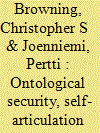

|
|
|
|
|
| Summary/Abstract |
The concept of ontological security has made increasing headway within International Relations, in particular through its ability to offer alternative explanations of the forces underpinning security dilemmas and conflict in world politics. While welcoming the insights already provided by its application, this article argues that the concept’s use to date has been too much geared to questions of identity-related stability, with change viewed as disturbing and anxiety-inducing. In contrast, the article calls for a more open understanding that: (i) links ontological security to reflexivity and avoids collapsing together the concepts of self, identity and ontological security; (ii) avoids privileging securitization over desecuritization as a means for generating ontological security; and (iii) opens out the concept beyond a narrow concern with questions of conflict and the conduct of violence more towards the theorization of positive change.
|
|
|
|
|
|
|
|
|
|
|
|
|
|
|
|
| 7 |
ID:
151180
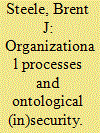

|
|
|
|
|
| Summary/Abstract |
This paper builds upon previous work that has sought to use ontological security to understand problematic and violent state practices, and how they relate to the securitizing of identity. Yet like much (although not all) work which has utilized it in International Relations theory, the application of ontological security theory (OST) to state ‘drives’ has provided only a superficial unpacking of ‘the state’. Further, while OST scholars have examined environmental or background conditions of ‘late modernity’, and how these conditions facilitate anxiety and uncertainty for agents, the content of such factors can be further explicated by placing OST in conversation with one particular systemic account. Alongside ‘the state’ and ‘late modernity’, the paper therefore explores several complementary sites shaping the ontological security seeking process of, within and around states. The paper reads the 2000s re-embrace of torture by the United States by examining ontological security alongside: (1) the structural level via Laura Sjoberg’s ‘gender–hierarchical’ argument; (2) the routinized organizational processes (via Graham Allison) of the US intelligence community and specifically the Central Intelligence Agency; and (3) the narrated interplay between public opinion and elite discourses.
|
|
|
|
|
|
|
|
|
|
|
|
|
|
|
|
| 8 |
ID:
151179


|
|
|
|
|
| Summary/Abstract |
In this brief essay, I explore the relationship between ‘states’ (or more broadly, institutions of political authority) and ontological security. Drawing from historical examples, I argue that it is a mistake to assume that all ‘states’ seek ontological security: this generalisation applies only to those polities that claim to be the main ontological security providers. I then develop a typology of institutional ontological security provision arrangements as have existed throughout history, arguing that another reason the concept of ontological security is valuable for international relations (IR) is because it offers a way to compare systems across time and space without assuming the primacy of politics or religion. In summary, IR does not have to limit its use of the concept of ontological security to a synonym for ‘state identity’ – ontological security can offer much more than that by helping the discipline reach across time and space.
|
|
|
|
|
|
|
|
|
|
|
|
|
|
|
|
|
|
|
|
|